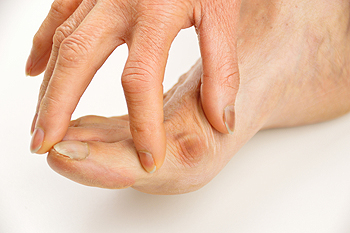Causes of Bunions
Tuesday, 08 April 2025 00:00
Bunions are often caused by genetics, abnormal foot structure, or arthritis, leading to the gradual misalignment of the big toe. People with a family history of bunions are more likely to develop them, as genetic factors can influence foot shape. Abnormal foot mechanics, such as flat feet or an imbalance in the way you walk, can put excessive pressure on the toe joint, contributing to bunion formation. Arthritis, particularly osteoarthritis, can also cause joint inflammation, leading to the development of bunions. Symptoms of bunions include pain, swelling, and redness at the base of the big toe. As the tip of the toe angles toward the second toe, it can be difficult to wear shoes and walk comfortably. In severe cases, the condition can cause stiffness or even hammertoe. A podiatrist can diagnose the condition and provide treatment options, including custom orthotics, anti-inflammatory medication, or surgery, if needed. If you have a painful bunion, it is suggested that you schedule an appointment with a podiatrist.
If you are suffering from bunions, contact one of our doctors of Coral Desert Foot & Ankle. Our doctors can provide the care you need to keep you pain-free and on your feet.
What Is a Bunion?
A bunion is formed of swollen tissue or an enlargement of boney growth, usually located at the base joint of the toe that connects to the foot. The swelling occurs due to the bones in the big toe shifting inward, which impacts the other toes of the foot. This causes the area around the base of the big toe to become inflamed and painful.
Why Do Bunions Form?
Genetics – Susceptibility to bunions are often hereditary
Stress on the feet – Poorly fitted and uncomfortable footwear that places stress on feet, such as heels, can worsen existing bunions
How Are Bunions Diagnosed?
Doctors often perform two tests – blood tests and x-rays – when trying to diagnose bunions, especially in the early stages of development. Blood tests help determine if the foot pain is being caused by something else, such as arthritis, while x-rays provide a clear picture of your bone structure to your doctor.
How Are Bunions Treated?
- Refrain from wearing heels or similar shoes that cause discomfort
- Select wider shoes that can provide more comfort and reduce pain
- Anti-inflammatory and pain management drugs
- Orthotics or foot inserts
- Surgery
If you have any questions, please feel free to contact one of our offices located in St. George and Kanab, UT, and Mesquite, NV . We offer the newest diagnostic and treatment technologies for all your foot care needs.




